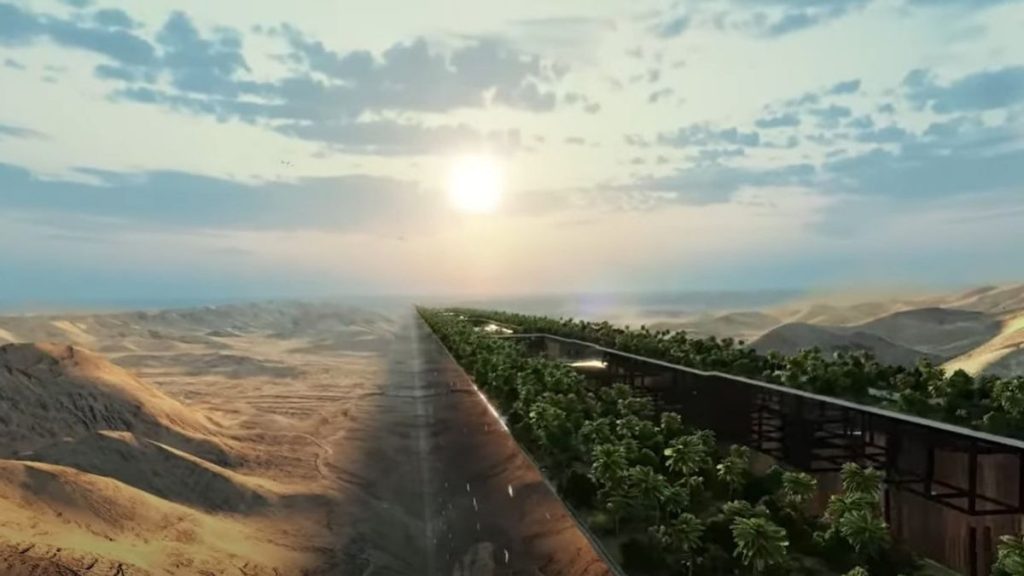Saudi Arabia is trying to redefine its economic, social, and urban fabric. Through a study trip to the Netherlands, Dr. Majed Mustafa Hallawani hopes to share best practices on urban development with Saudi municipal practitioners.

The Line, the future city of glass, is 170 kilometres long. (NEOM YouTube screenshot)
Saudi Vision 2030
Dr. Majed Mustafa Hallawani is the Vice-Dean of Postgraduate Studies and Research at King Saud University and is involved in Saudi Arabia’s urbanist future.
The Saudi Vision 2030 is a plan to diversify Saudi Arabia’s economy and society. One of the plan’s key goals is to transform Saudi Arabia’s urban fabric.
“The goal is to have three cities in the list of the top 100 most liveable cities. Liveability and enhancing the quality-of-life quality are some of the main goals of the Saudi vision”.
Majed is also the director of the postgraduate diploma programme in Urban Planning and Design. The diploma is attended by officials from the Ministry of Municipal and Rural Affairs in Riyadh, Saudi Arabia’s capital, and by municipal officials from 17 Saudi cities. They will be the ones working with Saudi Arabia’s ambitious goal to transform its cities.
As a part of their programme, they came to the Netherlands earlier this year for a study visit supported by the Associated of Dutch Municipalities (VNG). The Hague Academy contributed to the programme through a five-day interactive training on Urban Governance and Local Development.
In the Netherlands, they discussed neighbourhood public spaces, placemaking, cityscapes, and the design of urban parks. Interestingly – as Majed highlights – this visit also served as further fuel for Saudi cities to move away from cars.
Dutch-Inspired Mobility Solutions
In the Netherlands, many people can live their everyday lives without using a car, and not just in the major cities. One of the goals expressed by Majed is to move away from car reliance to a more healthy, mixed network. One that is healthier for both people and the environment.
“I went for a walk in The Hague yesterday, inside the neighbourhoods, and what I love is that when cars come, it is pedestrians and bicycles that have priority. This is one of the things I really hope to see in Saudi Arabia”.
However Dutch practices are not immediately transferable to Saudi Arabia. After all, “the weather is a little bit harsh when compared to the Netherlands”. The challenge will be to build up the necessary infrastructure for a sustainable and truly integrated transport network.
As Majed continues, “population growth is a challenge”. Saudi cities are experiencing rapid growth, and many lack public transport infrastructure outside of buses. Traffic is an issue, and Majed describes extended rush hours that last from eight in the morning to eight in the evening. These are becoming commonplace.
In many cases, Saudi officials would have the dual challenges of implementing public transport infrastructure while dealing with the immediate demand of alleviating high car traffic. Adding to this challenge is the need to ensure that public transport is well-connected.
“As we improve public transport infrastructure, there will be an increase in the number of pedestrians walking to the train or metro stations. So, cities don’t have the full infrastructure to move people from their residential neighbourhoods to the train station. Taking into account the high temperatures, we are considering solutions such as shaded sidewalks. This concept of integrated transport networks is one of the issues that trainees learnt here”.
Still, things are moving forward. Riyadh is expected to open new its metro system in 2024 – and it has become one of the largest public transport projects in the world and the centrepiece of the city’s new transit network.
Car-Free Future
There are already glimpses of the future, many based around the car-free neighbourhood. The new King Salaman Neighbourhood in Riyadh implements many good practices of urban development, giving priority to people and making the area walkable. One project that has reached headlines is The Line, a 170-kilometre-long smart city with no streets or cars, all amenities and needs designed to be reachable by walking or through its central transport line. But not all initiatives need to be futuristic megaprojects.
In the Netherlands, Majed identified an ideal solution for many of Saudi Arabia’s cities: trams. They share the streets with cars so do not require a large infrastructure overhaul, and can alleviate traffic while still making the streets safer for pedestrians.
“Trams are more friendly. They can slow down when people cross, and they can take you to places usually buses cannot if there’s a narrow street”.
Mecca and Medina are two holy cities that attract millions of visitors every year. A tram system there, Majed explains, would be an effective and relatively quick solution.
Having seen examples of placemaking in The Hague, Majed identifies it as a tool officials can use in the future. Through placemaking – including people in the decision-making and design of their communities – Saudi officials could better assess their needs and adapt to their local context. They see it as a good way to work with communities to build transport systems they would want to use.
A Continued Partnership
Majed already has plans for the next batch of students from the executive masters to take the training programme in January and July 2024. They will be officials from the Ministry of Municipal and Rural Affairs.
“We are establishing a training centre now in Saudi Arabia. It will be inside the ministry so this will make it easier for us to have a smooth connection and cooperation with The Hague Academy”.
Related courses
We offer a diversity of courses throughout the year. Here are several other courses you might like.


